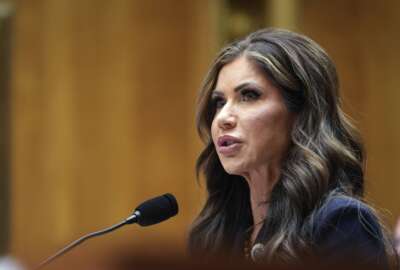Outside experts see White House merger plan hitting choppy waters
There\'s waste and confusion among the six trade- and business-focused agencies that the White House wants to consolidate. That\'s the conclusion of four panelists...
wfedstaff | June 4, 2015 5:46 pm
There’s waste and confusion among the six trade- and business-focused agencies that the White House wants to consolidate. That’s the conclusion of four panelists who debated the merits of the proposed merger at the American Enterprise Institute, a free-market Washington think tank.
The experts disagreed, however, on the best solution.

Their conversation may foreshadow the one lawmakers are likely to have as they consider a bill that would give President Barack Obama the authority to consolidate agencies. Combining the Commerce Department, the U.S. Trade Representative and four other agencies into a single department that could foster economic growth and job creation would be the President’s first use of the authority, Office of Management and Budget Acting Director Jeff Zients said in a letter to House Speaker John Boehner (R-Ohio).
‘Fragmented’ system for business
There’s good reason to focus on these agencies.
When it comes to government services for businesses, particularly with regard to trade, the United States has the most fragmented system in the world, said Center for American Progress Senior Fellow Jitinder Kohli.

“It’s hard to think of another industrialized nation with so many fingers in the pie trying to make their country successful for the long term,” he said.
He painted a picture of each agency pointing to another one, claiming that they are responsible for the country’s economic policy as a whole. But in reality, he said, even the National Economic Council inside the White House is too busy “putting out fires” to set a long-term economic agenda.
“There’s certainly duplication among some of the activities of these different agencies, particularly on trade promotion rather than trade liberalization,” said U.S. Chamber of Commerce Vice President of International Affairs John Murphy.
That’s an important distinction to chamber members. The Obama administration is more focused on enforcing current trade laws and promoting exports than negotiating new trade agreements, he said.

“When the administration comes along and says we’d like to move USTR and subsume it under these trade-promotion functions, that means that the trade-liberalizing function — which the business community regards as very important and we have a lot of priorities that we’d like to talk about — is not going to be well served,” he said.
Thorny issue in election year
The chamber wrote a letter to Obama last month detailing its concerns about moving USTR into a larger department. But Murphy said his members had not been spending a lot of resources on lobbying lawmakers because they did not believe it was necessary.
Lawmakers are reluctant to deal with such a thorny issue as the agency reorganization during an election year.
Trade attorney Gary Horlick predicted that agricultural interests with the ear of Congress would stop any merger from happening.
“The agriculture community has a close connection to USTR,” he said. “The idea of moving it to the Commerce Department, which, historically, doesn’t care about agriculture and tramples on it, strikes me as unlikely.”
Rethinking interagency process
And some would say it isn’t necessary anyway.
“It’s not reorganization that’s needed, but a rethink of the interagency process,” Murphy said. The chamber would like to see the small USTR beefed up with more resources and detailees from other agencies.
That may seem like a more palatable solution than uprooting and merging six agencies, but Kohli countered that it’s not a practical one.
“It’s easy to argue for small amounts of additional money in every corner of government,” he said. “It’s very hard to make big decisions on how you actually make government work better for the long term.”
During Gordon Brown’s tenure as prime minister in Great Britain, Kohli oversaw a small but powerful regulatory agency that became part of a bigger agency focused on competitiveness. During the transition period, he dealt with issues of morale and productivity among his 100-or-so employees, he said. But by the end of the transition, they had more might as part of a larger agency.
“Having someone responsible for competitiveness — a person who could bang their hands on the Cabinet table and say, ‘This is really important to us and this is the right way to make policy’ — mattered,” he said, adding that the agency’s productivity rose after the merger.
RELATED STORIES:
White House unveils new trade initiatives, website as first steps in agency overhaul
Analysis: Government reorganization ‘challenging terrain’ for Obama
Obama formally seeks agency-consolidation authority
Copyright © 2025 Federal News Network. All rights reserved. This website is not intended for users located within the European Economic Area.





